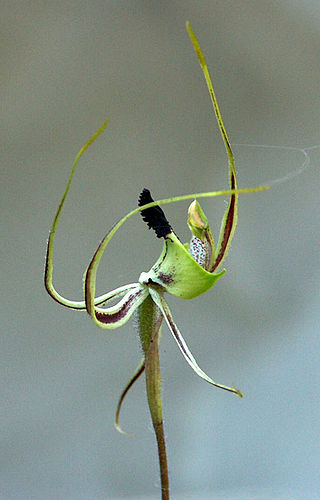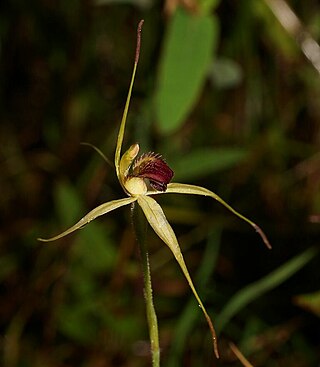
Caladenia integra, commonly known as the smooth-lipped spider orchid is a species of plant in the orchid family, Orchidaceae and is endemic to the south-west of Western Australia. It can be distinguished by its distinctive smooth-edged labellum and its upswept lateral sepals.

Caladenia ampla, commonly known as the dainty spider orchid, is a plant in the orchid family Orchidaceae and is endemic to Victoria. It is a ground orchid with a single hairy leaf and a single flower which is sometimes yellowish-green flower with red stripes and sometimes entirely red.

Caladenia ancylosa, commonly known as the Genoa spider orchid, is a plant in the orchid family Orchidaceae and is endemic to Victoria. It is a ground orchid with a single hairy leaf and a single cream-coloured flower with red markings.

Caladenia australis, commonly known as southern spider orchid, is a plant in the orchid family Orchidaceae and is endemic to Victoria, although it was also found on one Bass Strait island on one occasion in 1968. It has a single hairy leaf and usually only one creamy-yellow flower with red streaks, the flower on a hairy stalk.

Caladenia calcicola, commonly known as the Bats Ridges spider orchid, is a plant in the orchid family Orchidaceae and is endemic to a small area near the Victoria - South Australia border. It is a ground orchid with a single hairy leaf and one or two glossy, pale yellow flowers with maroon markings.
Caladenia cremna, commonly known as Don's spider orchid, is a plant in the orchid family Orchidaceae and is endemic to a small area in Victoria. It is a rare ground orchid with a single hairy leaf and a single yellow flower with red striations.

Caladenia cretacea, commonly known as Stuart Mill spider orchid, is a plant in the orchid family Orchidaceae and is endemic to a small area in Victoria. It is a rare ground orchid with a single leaf and one or two white flowers on a hairy stalk.

Caladenia flavovirens, commonly known as the summer spider orchid, or the Christmas spider orchid is a plant in the orchid family Orchidaceae and is endemic to Victoria in Australia. It is a ground orchid with a single hairy leaf and one or two pale greenish-yellow flowers.

Caladenia fragrantissima, commonly known as the scented spider orchid, is a plant in the orchid family Orchidaceae and is endemic to Victoria and South Australia. It is a ground orchid with a single hairy leaf and up to three creamy-white to yellowish-green flowers. It is possible that it is conspecific with Caladenia orientalis.
Caladenia hastata, commonly known as Mellblom's spider orchid is a plant in the orchid family Orchidaceae and is endemic to Victoria. It is a ground orchid with a single hairy leaf and up to three white to cream-coloured flowers with red markings on the labellum.
Caladenia oreophila is a plant in the orchid family Orchidaceae and is endemic to south-eastern Australia. It is a ground orchid with a single leaf and a single greenish-cream flower with pale red stripes a red labellum with a greenish-cream base.
Caladenia osmera is a plant in the orchid family Orchidaceae and is endemic to south-eastern Australia. It is a ground orchid with a single leaf and one or two greenish-cream flowers with pink stripes and which has a sharp odour resembling burnt plastic.
Caladenia peisleyi is a plant in the orchid family Orchidaceae and is endemic to south-eastern Australia. It is a ground orchid with a single leaf and a single greenish-yellow flower with pale red stripes. It is difficult to distinguish from several other Caladenia species.

Caladenia villosissima, commonly known as the hairy spider orchid, is a plant in the orchid family Orchidaceae and is endemic to Victoria. It is a ground orchid with a single densely hairy leaf and a single pale green flower with red stripes along the sepals and petals. It is a poorly known species and there is insufficient information about its distribution and abundance to determine whether or not it is endangered.
Caladenia armata is a plant in the orchid family Orchidaceae and is endemic to the Australian Capital Territory. It has a single dull green leaf with purple blotches near the base, and a single cream-coloured to pink flower with red to maroon markings. It is only known from a single population containing fewer than ten plants.
Caladenia branwhitei, commonly known as the Bethungra spider orchid, is a plant in the orchid family Orchidaceae and is endemic to southern New South Wales. It has a single dull green leaf and one or two, usually dark red to maroon-coloured flowers. It is only known from three areas near Bethungra where it grows in ironbark forest.
Caladenia douglasiorum is a plant in the orchid family Orchidaceae and is endemic to central Victoria in Australia. It is a ground orchid with a single hairy leaf and a single greenish-cream to yellowish flower with red marks.
Caladenia saxatilis is a plant in the orchid family Orchidaceae and is endemic to South Australia. It is a ground orchid with a single hairy leaf and one or two pale creamy-green flowers, sometimes with thin reddish lines. It occurs in the southern Flinders Ranges.
Caladenia flindersica is a plant in the orchid family Orchidaceae and is endemic to South Australia. It is a ground orchid with a single leaf and one or two cream-coloured flowers with thin dark red to blackish tips on the petals and sepals. It is only known from Alligator Gorge in the Mount Remarkable National Park.
Caladenia fuliginosa is a plant in the orchid family Orchidaceae and is endemic to the Yorke Peninsula in South Australia. It is a ground orchid with a single hairy leaf and a single relatively large, creamy-yellow flower, sometimes with reddish lines. The flowers have a smell resembling hot metal.









